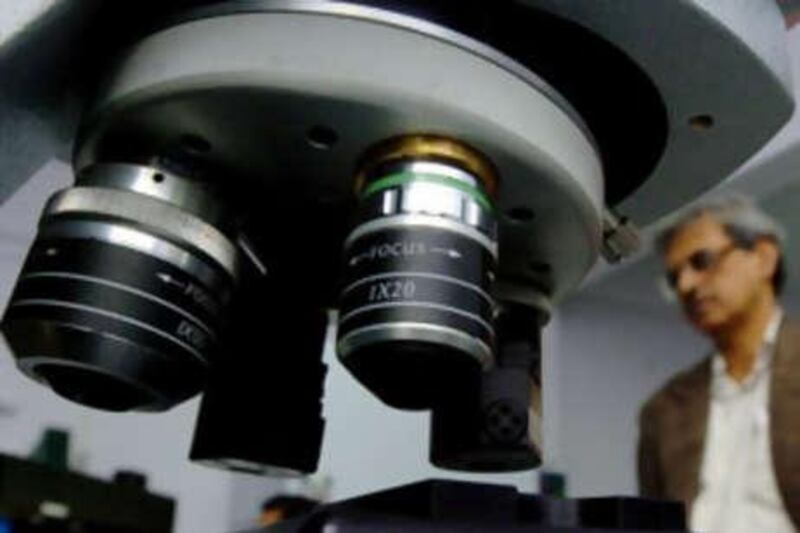A multimillion-dollar centre is to be created to study advances in nanotechnology. Scientists aim to improve treatments for cancer, create better solar energy technology and produce stronger building materials at the Emirates Centre for Nanosciences and Nanoengineering. The research centre is being set up within the College of Engineering at UAE University in Al Ain following a grant from the National Research Foundation (NRF), which was itself created earlier this year.
There are 18 researchers at the university working in nanotechnology, but the NRF's Dh37.5 million (US$10.2m) grant, to be spent over five years after the centre launches next year, will enable a further seven to 10 people to be taken on. Up to now, the research at UAEU, one of three federal higher education institutions, has been funded by grants from the university and the Emirates Foundation. "We are very much excited because 50 countries have already started nanotechnology initiatives and we hope to be a nucleus for nanotechnology in the UAE," said Prof Yousef Haik, the centre's director and principal investigator.
Nanotechnology is developed at the level of atoms, molecules or larger molecular structures and involves structures less than 100 nanometres in size, with a nanometre being one millionth of a millimetre. The centre, to be made up of five groups of scientists, will focus on areas including bio-nanotechnology, which includes areas such as the diagnosis and management of cancer. Prof Haik said there had been "very encouraging" results during experiments on animals at UAEU in which tiny particles called nanoparticles had tracked down cancer cells that had earlier been introduced into the animals.
Such technology could be used to locate and destroy tumours, thanks to the ability of the nanoparticles to generate heat. A nanoenergy group aims to develop materials that can for example be used to absorb and retain heat in the walls, reducing the need for air conditioning. Researchers will also try to create stronger materials for use in construction and other industries. Among the most promising materials could be those made from long cylindrical carbon molecules, called carbon nanotubes.
One research group within the centre is to consider the ethics and impact on society of nanotechnology, including the environmental implications. Dr Reyadh al Mehaideb, dean of UAEU's College of Engineering, said there was already a focus on nanotechnology in several Middle East countries, including Saudi Arabia and Iran. "The investment is being made because it's a promising area for intellectual property rights and patents, with new applications in medicine and engineering," he said.
"It's a new technology that's come up in the world in many different fields. There is a new class of products that we'll probably be using in the next generation." The grant for the centre was announced at the second international conference on bio-nanotechnology this month at Abu Dhabi National Exhibition Centre. Sheikh Nahyan bin Mubarak, the Minister of Higher Education and Scientific Research, said at the conference: "Nanotechnology has huge potential to effect changes in the fields of energy, technology, medicine, communications, the food industry, military strategies and national security."
More than 150 research papers by scientists from more than 30 countries were presented, compared to around 80 papers at the first bio-nanotechnology conference in 2006. As well as the nanotechnology centre, the NRF is funding the setting up of two further research institutes at UAEU, to cover water and the environment, and genes and diseases. A centre at Zayed University researching bilingualism in the Arab world and bilingual education is also being set up with NRF funding.
dbardsley@thenational.ae







